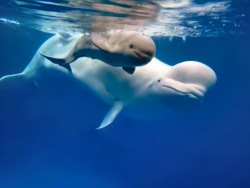One-of-a-kind: Primorsky Aquarium welcomes a baby white whale

Jessica, a 14-year-old beluga at the Dolphinarium of the Primorsky Aquarium, has become a mother for the first time: an energetic calf was born on August 1. This event is particularly unique because Jessica is the first white whale to deliver a baby in the aquarium setting in Russia.
“Jessica gave birth unassisted and did not need our help,” explained Igor Kostychev, Manager of the Dolphinarium at the Primorsky Aquarium. “The female calf came out at night at 1:20 a.m. and almost at once started nursing her mother, though in belugas, it does not necessarily occur on the first day after birth. Initially, Jessica, who has proved to be a very caring mother, nursed her baby once or twice an hour, and now feeding sessions are less frequent but longer. In a few months, the calf will begin to take fish but will continue to depend on her mother’s milk until she is 18 months-2 years old.”
After the baby’s arrival, the father – beluga Ler – tried to be around his family nearly all the time. In the first days of life, when the calf was just learning to swim, the parents pushed her to the surface, keeping the baby afloat. With each day her swimming skills got better and better, and a week later she was able to hold breath for a long time.
Currently, the beluga calf is undergoing its first moult, and according to aquarists, this process means that she is developing on schedule.
“We are keeping a close eye on the belugas but are trying not to disturb the nursing mother with her baby too often,” said Igor Kostychev. “The first weeks of life are extremely critical for the health and well-being of baby belugas, especially of those from novice mothers, both in the wild and in captivity.”
When a strict quarantine is over, the first beluga calf born at the Russian aquarium will be monitored not only by our trainers and veterinarians but also by scientists. By now, Jessica and her baby have drawn special attention from marine biologists and sonar researchers.
General Information:
— Newborn beluga calves are bluish brown and thus are often called “baklazhany” (eggplants) in Russia. Then babies turn grey and as they mature, they develop white colouration.
— The gestation period for belugas is between 12 and 14 months, and a calf stays with its mother for at least two years.